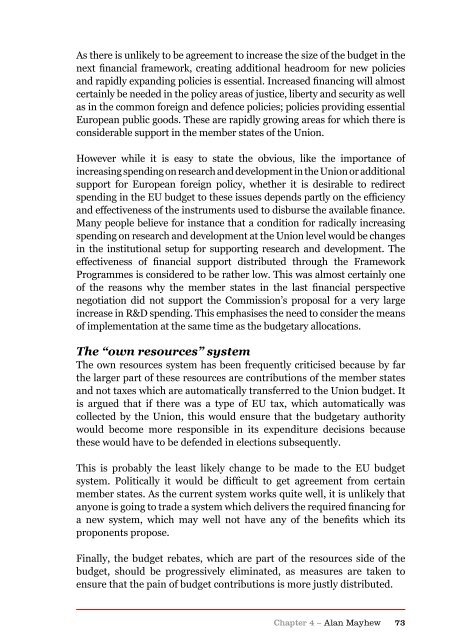Authors Iain Begg | Gabriel Glöckler | Anke Hassel ... - The Europaeum
Authors Iain Begg | Gabriel Glöckler | Anke Hassel ... - The Europaeum
Authors Iain Begg | Gabriel Glöckler | Anke Hassel ... - The Europaeum
You also want an ePaper? Increase the reach of your titles
YUMPU automatically turns print PDFs into web optimized ePapers that Google loves.
As there is unlikely to be agreement to increase the size of the budget in the<br />
next financial framework, creating additional headroom for new policies<br />
and rapidly expanding policies is essential. Increased financing will almost<br />
certainly be needed in the policy areas of justice, liberty and security as well<br />
as in the common foreign and defence policies; policies providing essential<br />
European public goods. <strong>The</strong>se are rapidly growing areas for which there is<br />
considerable support in the member states of the Union.<br />
However while it is easy to state the obvious, like the importance of<br />
increasing spending on research and development in the Union or additional<br />
support for European foreign policy, whether it is desirable to redirect<br />
spending in the EU budget to these issues depends partly on the efficiency<br />
and effectiveness of the instruments used to disburse the available finance.<br />
Many people believe for instance that a condition for radically increasing<br />
spending on research and development at the Union level would be changes<br />
in the institutional setup for supporting research and development. <strong>The</strong><br />
effectiveness of financial support distributed through the Framework<br />
Programmes is considered to be rather low. This was almost certainly one<br />
of the reasons why the member states in the last financial perspective<br />
negotiation did not support the Commission’s proposal for a very large<br />
increase in R&D spending. This emphasises the need to consider the means<br />
of implementation at the same time as the budgetary allocations.<br />
<strong>The</strong> “own resources” system<br />
<strong>The</strong> own resources system has been frequently criticised because by far<br />
the larger part of these resources are contributions of the member states<br />
and not taxes which are automatically transferred to the Union budget. It<br />
is argued that if there was a type of EU tax, which automatically was<br />
collected by the Union, this would ensure that the budgetary authority<br />
would become more responsible in its expenditure decisions because<br />
these would have to be defended in elections subsequently.<br />
This is probably the least likely change to be made to the EU budget<br />
system. Politically it would be difficult to get agreement from certain<br />
member states. As the current system works quite well, it is unlikely that<br />
anyone is going to trade a system which delivers the required financing for<br />
a new system, which may well not have any of the benefits which its<br />
proponents propose.<br />
Finally, the budget rebates, which are part of the resources side of the<br />
budget, should be progressively eliminated, as measures are taken to<br />
ensure that the pain of budget contributions is more justly distributed.<br />
Chapter 4 – Alan Mayhew 73

















